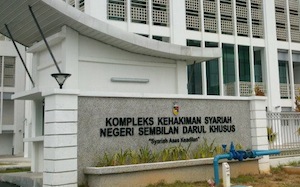Islam does not recognise transgenders, court hearing Shariah law review told
Zurairi AR, The Malaysian Insider
Islam does not recognise transgenderism, only hermaphroditism, the Attorney-General’s Chamber (AGC) argued in a judicial review of a Negri Sembilan state enactment that criminalises cross-dressing today.
The AGC’s counsel also contended that Section 66 of the Negri Sembilan Shariah Criminal Enactment 1992 is not unconstitutional as a state may enact laws upholding the precepts of Islam under item 1, List II, of the Ninth Schedule in the Federal Constitution.
“Islam does not recognise transvestites… Unless we’re talking about hermaphrodites, which they’re not,” said senior federal counsel Suzana Atan, referring to the transgender women who filed the review.
“Transvestite” is an outdated term that refers to a person who cross-dresses in the garb of the opposite gender, and is considered derogatory to some.
Meanwhile, “transwomen” and “transgender” are terms used to refer to those who were born male but associate themselves with the female identity, and has nothing to do with sexual preferences.
Suzana insisted that Islam does not allow a man to “become a female”, and Section 66 exists to protect a Muslim’s faith and “control his morality”.
Her response came after the three-man bench chaired by Justice Datuk Mohd Hishammuddin Mohd Yunus asked whether the law has failed to take into account the existence of those who suffer from gender identity disorder (GID), and whether they are ignored by authorities.
The AGC appeared as amicus curiae or “friend of the court” — independent parties who can raise their points in court.
Other amicus curiae present included the Malaysian Bar and the international liberties watchdog Human Rights Watch.
Lawyers Aston Paiva and Fahri Azzat represented three transgender clients who contend that Section 66 violates constitutional articles and do not apply to those diagnosed with GID.
The appellants were medically diagnosed with GID under the Diagnostic and Statistical Manual of Mental Disorders Fourth Edition (DSM IV), consistent with “the desire to dress as a female and be recognised as a female”.
They claimed that the section violates Article 8(2) that governs gender discrimination, 10(1)(a) on freedom of expression, 9(2) on freedom of movement, and 5(1) on the rights to dignity, privacy and livelihood.
State legal advisor Iskandar Ali Dewa was lead counsel for the respondents that include the Negri Sembilan state government, state religious authority and its officers.
Six civil societies including the Malaysian AIDS Council and PT Foundation, the Kuala Lumpur Women and Health Society, the Malaysian Mental Health Society, and the Malaysian Centre for Constitutionalism and Human Rights were observing parties and also represented by lawyers at the court.
The court will deliver its judgment on November 7.


